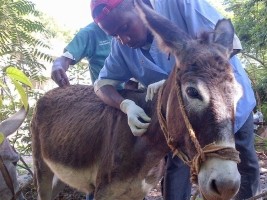27/04/2015 12:45:03
 |
The strengthening of animal health programs have allowed to reduce losses due to animal diseases in livestock (among others: Coal, New castle, Classical Swine Fever, Teshen and parasitic diseases), to reduce the risk of animal diseasetransmission to humans and the risk of introduction of exotic diseases due to increased international trade.
Results obtained at 31 December (2011-2014) :
At the 570 communal sections of the country, about 75% of "Gwoupman sante bèt" (GSB) are functional and support the coordination of the various programs implemented by the Community veterinary agents such as livestock identification, vaccinations (coal, rabies and Newcastle), the revolving credit in goats. Moreover, federations were created n at least 60% of the 140 communes of country and have integrated the municipal Committees of animal health and the departmental committees monitoring of cattle identification program ;
- The availability of veterinary workers in all communal sections of the country has been strengthened by the formation of 315 new veterinary agents (150 directly by the Ministry and 165 in partnership with NGOs such as Heifer International (114) and the Veterinary Christian Mission (51). 1,250 agents were recycled, the country now has about 1,565 community veterinary agents. These agents are not civil servants but vaccinate animals on behalf of the State and they are paid by farmers ;
- Regular vaccination operations were carried out on an annual basis against anthrax, rabies, Classical Swine Fever (CSF) and Newcastle disease. In addition, a recovery system of breeders contributions is being structured ;
- A vaccine against Teschen disease has been developed, tested and manufactured in large quantities (500 000 doses). It is currently available for farmers and vaccination was initiated ;
- To support the national logistics of vaccination, vaccine conservation units (numbering 146)to veterinary use, consisting of solar refrigerators were installed in 95% of the 140 communes in the country ;
- A partnership was concluded with a group of civil society, including the "National Federation of Haitian Milk Producers' (FENAPWOLA) for the collection of contributions of breeders who must ensure the replenishment of vaccines and other inputs for livestock identification with the Ministry of Agriculture through the Production Department and Animal Health ;
- At the Veterinary Laboratory and control of food quality of Tamarinier, the Ministry benefits for the past 10 years, of the technical support of the Cuban cooperation, of the Tuskigee University, of the Chibas Foundation, etc... and of international financing, which allows among other things, to make the training of technicians. A restructuring plan of the laboratory was developed and some development works are underway. Premises were also prepared to host proximity laboratories in provinces ;
- Quarantine stations have been built or rehabilitated in all ports and international airports and border crossings points ;
- Since December 2014, the control of the slaughter of cattle has been strengthened throughout the territory of the North and Northeast departments, and was initiated in the other eight departments of the Republic ;
- The Ministry of Agriculture has developed and initiated a "strategic and investment plan for the modernization of zoo-phytosanitary protection services and food safety" ;
- The funding of Departmental centers of health protection has been negotiated with international partners and their construction are under study ;
- The draft law on modernization of health care services has been developed and provides for the creation of the "Health Agency of animals, plants and health food inspection", also a Draft Veterinary Public Health Code was prepared. Meanwhile the Ministry has decided to consolidate all directorates involved in animal and plant health protection within the Health Protection Unit (UPS).
Perspective (2015-2017) :
The financing of the implementation of the "strategic and investment plan for the modernization of zoo-phytosanitary protection services and food safety" is provided in part through funding from the World Bank (RESEPAG Project), of the IDB (new grant agreement in preparation), the EU and the Treasury. This will allow to continue :
- The strengthening of GSB in all communal sections as well as communal committees of animal health and of departmental committees for monitoring cattle identification program ;
- The construction of the first 3 Departmental Centers of Health Protection;
- The strengthening and sustainability of all regular immunization programs ;
- The implementation of the restructuring plan for the Veterinary Laboratory and of control of food quality of amarinier. Some departmental laboratories will be equipped and put into operation ;
- The operationalization of all animal and plant quarantine stations ;
- The basic control of slaughter in all major abattoirs in the country that will evolve gradually towards true health inspection where slaughter conditions permit it ;
- The preparation of a project to reopen the technical school of The preparation of a project to reopen the technical school health and animal production ;
- The presentation of the resumption of the training program for new veterinarians with Cuban cooperation ;
- Presented to the Council of Ministers of the draft law on the modernization of health protection services and of Veterinary Public Health Code.
HL/ HaitiLibre
No comments:
Post a Comment